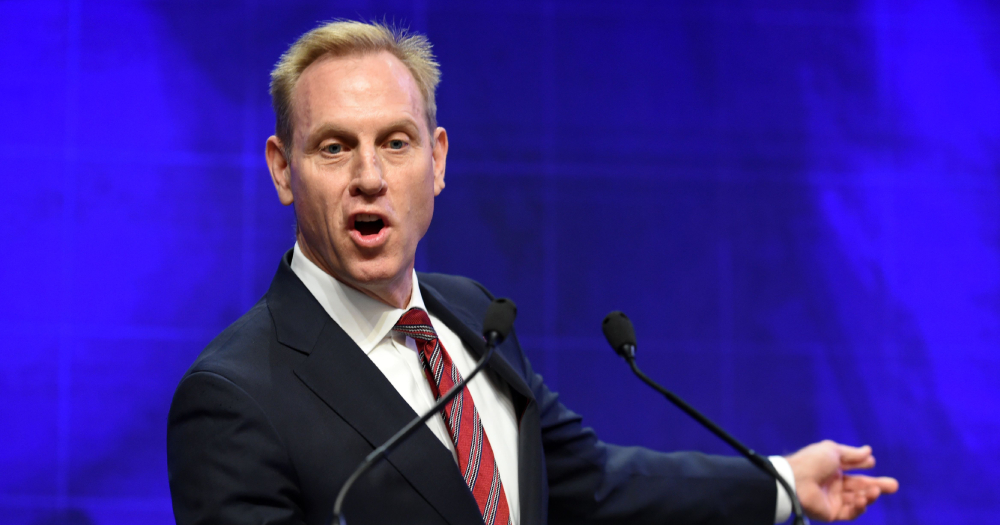Acting United States Defence Secretary Patrick Shanahan has said the U.S. and China are not having a trade war and would eventually resolve their differences, downplaying trade tensions that heightened between the two countries recently.
He said this on Saturday, June 1, after a speech he made at the ongoing Shangri-La Dialogue held in Singapore that ends on Sunday, June 2.
The U.S. is building relations with China's military
Responding to a question from a participant about a "face-off" between both countries, Shanahan added that trade negotiations are ongoing, and said the U.S. is building relations with the Chinese military.
The annual high-profile security summit is attended by hundreds of high level delegates, including ministers and regional defence chiefs.
This was Shanahan's first major speech overseas.
On his first day as acting defence secretary on January 2 this year, he said the U.S. military would focus on "China, China, China".
Met Chinese Defence Minister hours before
Just the night before, Shanahan had a 20-minute meeting with the Chinese Defence Minister Wei Fenghe, which was "constructive and productive", Pentagon spokesperson Lieutenant Colonel Joe Buccino told reporters afterwards, according to Reuters.
Both of them discussed ways to build military-to-military relations that can "reduce the risk of misunderstanding and miscalculation" between the two countries.
They also discussed how the two militaries could cooperate to better enforce sanctions on North Korea.
Buccino said both leaders hope to build on the evening's discussion with "future engagements".
Shanahan's predecessor, Jim Mattis, said the same last October when he met Wei on the sidelines of the ASEAN defence ministers' meeting held in Singapore.
Mattis resigned from his post two months after the meeting.
Slammed China for its behaviour in the South China Sea
In his speech, Shanahan did touch directly on China, saying it would benefit from a "cooperative relationship with the U.S.", and that it is in China's interest to do so.
He said they can cooperate and compete, as long as this is done in accordance with "internationally-established rules". He also added:
"China can and should have a cooperative relationship with the rest of the region, too. But behaviour that erodes other nations’ sovereignty and sows distrust of China’s intentions must end."
This was not before his speech took a turn for the passive-aggressive, though, spending a good part of it going at length against unnamed countries he referred to as "some in our region" who he alleges to have acted "contrary to the principles and norms that have benefited us all".
Widely viewed as a veiled reference to China, he said such actors who seek to "undermine" the rules-based international order are using "a toolkit of coercion" to "destabilise the region".
Examples of the "toolkit of coercion" include the following:
- Militarising disputed areas
- Using influence operations to interfere in the domestic politics of other nations
- Engaging in predatory economics and debt for sovereignty deals
- Promoting state-sponsored theft of other nations' military and civilian technology
These are all accusations the U.S. has piled on China previously.
Later on, while taking questions from the floor, Shanahan reportedly did mention China specifically, saying the U.S. will no longer ignore Chinese behaviour in the region.
And around the same time as Shanahan was giving his speech, the U.S. Defence Department released a report that slammed China's behaviour in the region, accusing it of seeking "Indo-Pacific regional hegemony in the near-term and, ultimately global preeminence in the long-term".
In his speech, Shanahan also made an attempt to convince the Southeast Asian nations that the U.S. is here to stay, reaffirming the U.S.' "enduring commitment to the Indo-Pacific region and to the values that keep it secure and prosperous, free and open".
You can watch his full speech here.
China responds
China has since responded to Shanahan's comments.
According to the English-language arm of the Chinese state media CGTN, Lieutenant General Shao Yuanming, deputy chief of the Joint Staff Department of China's Central Military Commission, said China firmly rejects the "false remarks" on the South China Sea made by Shanahan.
In addition, he defended China's actions in the area, saying they "deploy necessary defence facilities according to the security situation faced by the islands and reefs of the South China Sea".
"This is the absolute right of a sovereign country, and the necessary response to provocative actions," he added.
China has laid claim to a large part of the South China Sea, despite a number of other Southeast Asian countries disputing its claims.
It has also in recent years increased its military buildup on the disputed islands in the maritime region.
The U.S. then stepped up the frequency of its freedom of navigation operations in the region in order to challenge China’s “excessive maritime claims”.
Wei also spoke after Shanahan
Wei has just given a speech on Sunday morning, June 2.
This is the first time in eight years that a Chinese defence minister is attending the Shangri-La Dialogue.
His presence at the summit was said to be "reassuring" by Singapore's Defence Minister Ng Eng Hen, as it shows a confident China that is "willing to engage with the region and the world".
https://mothership.sg/2019/06/pm-lee-shangri-la-dialogue-foreign-media/?fbclid=IwAR2yxZGFpby1n8OUOiPpeu-rRHZUCzaUKB1dY49K2IjusFH3bKGg9OY9J4Q
Top image via ROSLAN RAHMAN/AFP/Getty Images
If you like what you read, follow us on Facebook, Instagram, Twitter and Telegram to get the latest updates.
